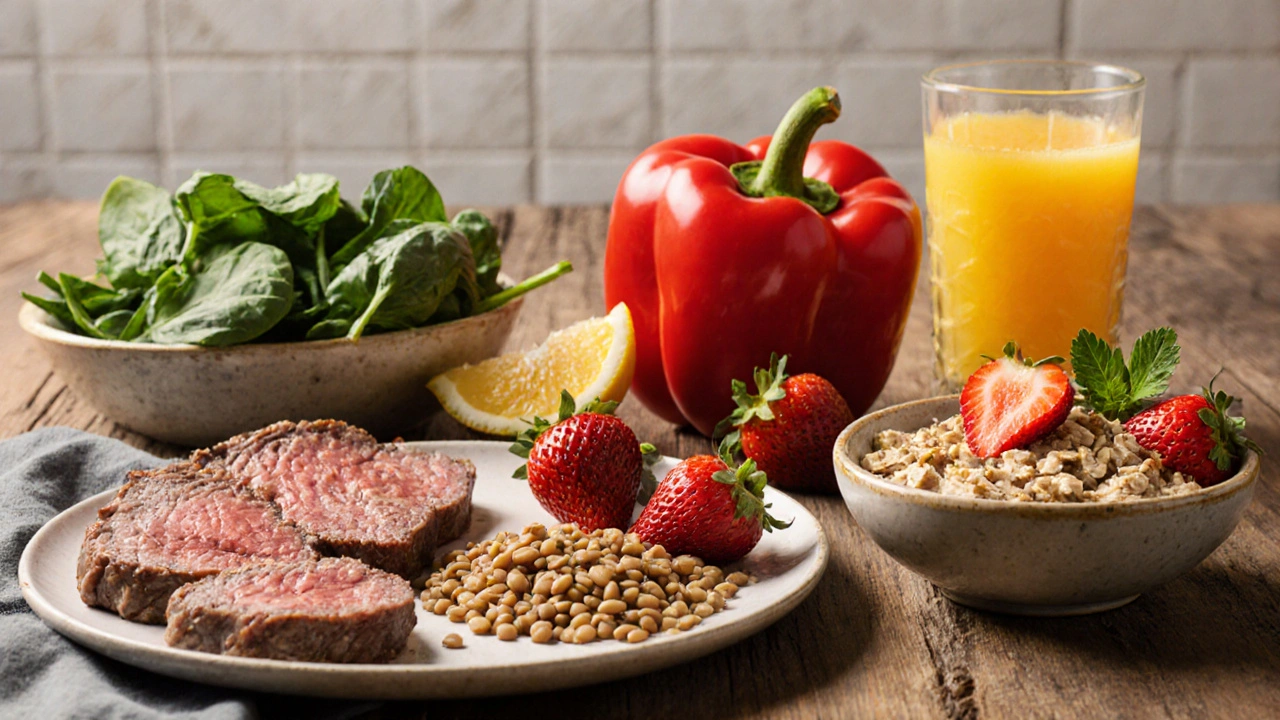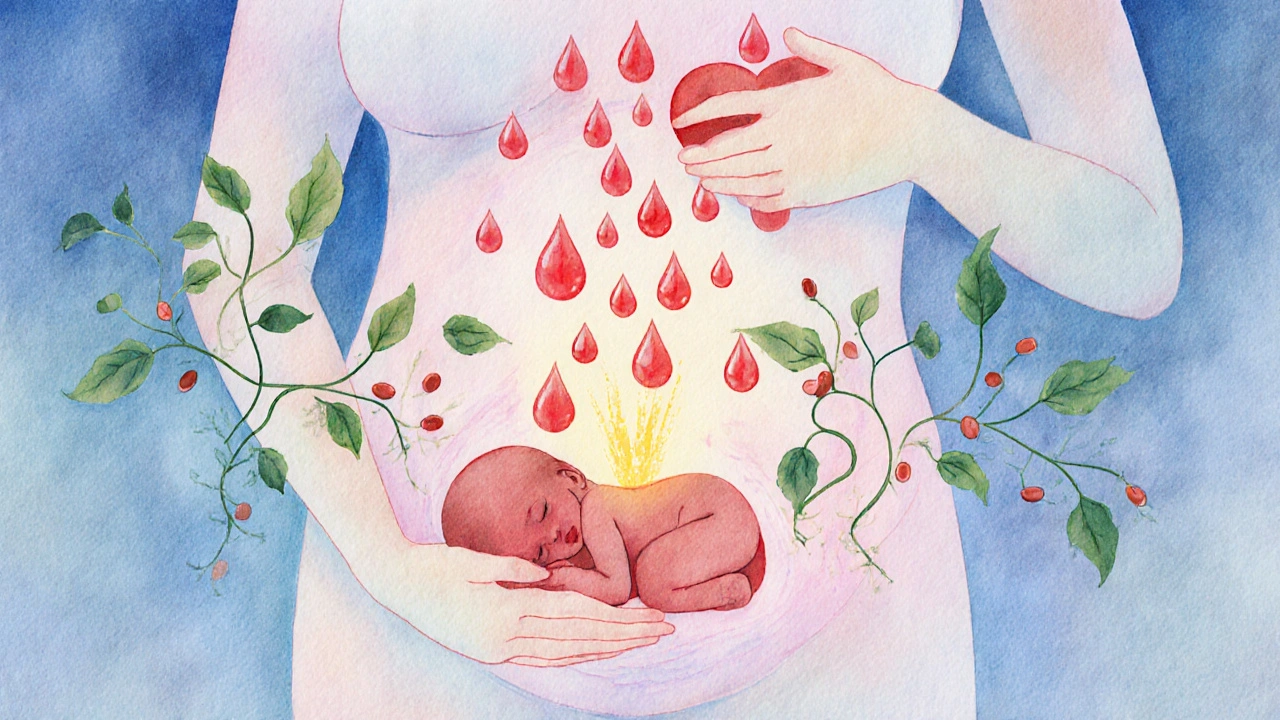Pregnancy Iron Calculator
Calculate your daily iron needs during pregnancy. Iron is critical for oxygen transport to your baby and preventing maternal anemia. This calculator uses WHO guidelines and incorporates trimester-specific requirements.
When Anemia in pregnancy refers to a drop in hemoglobin levels that occurs during gestation, often linked to poor nutrition, the stakes are higher than in a typical anemia case. A pregnant woman’s blood has to carry oxygen for two bodies, so any shortfall can affect both mother and baby. This guide explains which nutrients matter most, how deficiencies show up, and practical steps to keep you thriving throughout the nine months.
Key Takeaways
- Iron, folate, and vitaminB12 are the top three nutrients that, when lacking, cause anemia during pregnancy.
- Screening at the first prenatal visit and again at 28weeks catches most cases early.
- Dietary sources-red meat, leafy greens, legumes, fortified cereals-can meet up to 70% of iron needs when paired with vitaminC.
- Supplement timing (iron with food, folic acid on an empty stomach) reduces side‑effects and improves absorption.
- If hemoglobin falls below 10g/dL, seek medical advice; severe anemia (<7g/dL) requires urgent treatment.
Understanding Anemia in Pregnancy
Globally, about 38% of pregnant women experience anemia, according to the World Health Organization (WHO) classification. In the United Kingdom, the NHS reports a prevalence of roughly 20% among expectant mothers. The condition is defined by hemoglobin levels < 11g/dL in the first trimester, < 10.5g/dL in the second, and < 11g/dL in the third, reflecting the expanding blood volume.
Hemoglobin, the iron‑rich protein inside red blood cells carries oxygen from lungs to tissues, is the critical metric. When levels dip, fatigue, shortness of breath, and dizziness become common, and the fetus may receive less oxygen, potentially slowing growth.
Common Nutritional Deficiencies that Trigger Anemia
Three nutrients dominate the anemia picture in pregnancy:
- Iron - needed to build hemoglobin.
- Folate (vitaminB9) - essential for DNA synthesis in developing red cells.
- VitaminB12 - works with folate to mature red blood cells.
Iron‑Deficiency Anemia
Iron‑deficiency anemia (IDA) accounts for roughly 75% of all pregnancy‑related anemia cases. The body’s iron stores usually deplete by the second trimester because the fetus needs about 1g of iron for its own blood. Typical lab findings: low serum ferritin (<30µg/L), low transferrin saturation, and a microcytic, hypochromic red cell picture.
Symptoms include marked fatigue, restless legs, and cravings for non‑food items (pica). If untreated, IDA raises the risk of pre‑term birth and low birth weight.
Folate‑Deficiency Anemia
Folate deficiency often co‑exists with iron deficiency, especially in diets low in leafy greens and legumes. Labs show high mean corpuscular volume (MCV) and low serum folate. Apart from anemia, a shortage can cause neural‑tube defects in the baby, which is why the UK NHS recommends 400µg of folic acid daily before conception and through the first 12weeks.
VitaminB12 Deficiency
VitaminB12 deficiency is less common in the UK but rises among vegetarians, vegans, and women with malabsorption issues. It produces a macrocytic anemia (high MCV) and may also cause neurological symptoms like tingling or balance problems. Serum B12 below 150pmol/L signals a need for supplementation.

How Anemia Impacts Mother and Baby
Maternal complications include:
- Increased fatigue and reduced work capacity.
- Higher chance of postpartum hemorrhage due to depleted clotting reserves.
- Elevated risk of infections.
Fetal outcomes can be serious:
- Low birth weight (<2.5kg) in up to 30% of severe cases.
- Pre‑term delivery (before 37weeks) linked to maternal iron deficiency.
- Potential neurodevelopmental delays when folate or B12 are insufficient.
Screening and Diagnosis
Standard prenatal care includes a full blood count (FBC) at the booking appointment (usually 8-12weeks) and a repeat at 28weeks. The UK NHS anemia guidelines recommend checking hemoglobin, ferritin, and serum folate to pinpoint the cause.
Thresholds used by clinicians:
| Parameter | First Trimester | Second Trimester | Third Trimester |
|---|---|---|---|
| Hemoglobin (g/dL) | <10.5 | <10.5 | <11.0 |
| Serum Ferritin (µg/L) | <30 | <15 | <15 |
| Serum Folate (nmol/L) | <10 | <7 | <7 |
| Serum B12 (pmol/L) | <150 | <150 | <150 |
When any value falls below the cut‑off, targeted nutrition or supplementation is initiated.
Nutrition Strategies to Prevent & Treat Anemia
Food first is the safest approach. Pair iron‑rich foods with vitaminC sources to boost non‑heme iron absorption. Example meals:
- Breakfast: fortified oatmeal topped with sliced strawberries and a handful of pumpkin seeds.
- Lunch: quinoa salad with spinach, roasted chickpeas, red bell pepper, and orange‑vinaigrette.
- Dinner: lean beef stir‑fry with broccoli, bell peppers, and a squeeze of lemon.
Key dietary sources:
- Red meat (beef, lamb) provides heme iron, the most absorbable form.
- Leafy green vegetables such as spinach and kale, deliver non‑heme iron plus folate.
- Legumes beans, lentils, and peas supply iron and folate.
- Fortified cereals and breads add both iron and B12 (especially if fortified).
Remember that coffee, tea, and high‑calcium foods can inhibit iron absorption. Space them at least two hours away from iron‑rich meals.

Supplementation Guidelines
When diet alone can’t close the gap, supplements step in. The UK NHS advises:
- Iron: 30-60mg elemental iron daily, preferably as ferrous sulfate. Take with vitaminC (a glass of orange juice) and avoid dairy at the same time.
- Folic acid: 400µg daily pre‑conception and through 12weeks; higher (5mg) doses if there’s a personal or family history of neural‑tube defects.
- VitaminB12: 10µg daily for vegetarians/vegans; sublingual or injectable forms for absorption issues.
Side‑effects-nausea, constipation, and dark stools-are common with iron. Mitigate by starting with a lower dose, spreading it across meals, or switching to a slow‑release form.
For severe cases (Hb <8g/dL), doctors may prescribe therapeutic doses (e.g., 200mg elemental iron three times daily) for a short period, often followed by a maintenance dose.
Lifestyle Tips & Common Pitfalls
Beyond food and pills, a few habits make a difference:
- Stay hydrated-water helps the digestive tract move iron‑rich foods.
- Engage in moderate exercise (e.g., brisk walking) to boost circulation without over‑exerting.
- Monitor stool color-black stools can signal excess iron; discuss with a clinician.
- Schedule supplement intake at night if daytime side‑effects interfere with work.
A frequent mistake is stopping iron supplements once fatigue eases. Continue for at least three months after normal hemoglobin is reached to replenish stores.
When to Seek Professional Care
Even with diet tweaks, some signs demand immediate medical attention:
- Rapidly worsening fatigue or breathlessness.
- Heart palpitations or chest pain.
- Persistent dizziness or fainting.
- Swelling of the legs combined with shortness of breath (possible heart strain).
These could indicate severe anemia or an underlying condition like thalassemia, which requires specialist management.
Frequently Asked Questions
How much iron do I need each day during pregnancy?
The UK NHS recommends 14mg of elemental iron daily for pregnant women. If labs show deficiency, doctors may increase the dose to 30-60mg.
Can I get enough folate from food alone?
Leafy greens, legumes, and fortified cereals provide folate, but most guidelines still advise a 400µg supplement because dietary intake can be inconsistent.
Is it safe to take iron supplements with prenatal vitamins?
Yes, many prenatal formulas already contain iron. If you’re adding a separate iron pill, check the total elemental iron to avoid excess, which can cause constipation and nausea.
Why does my stool turn black after starting iron?
Iron reacts with digestive enzymes, creating a dark pigment. It’s harmless, but if you notice blood in stools (bright red) you should contact a doctor.
Can a vegetarian diet cause anemia in pregnancy?
Vegetarians can meet iron needs through beans, lentils, tofu, and fortified foods, but they must pair these with vitaminC and consider a B12 supplement to prevent deficiency‑related anemia.
